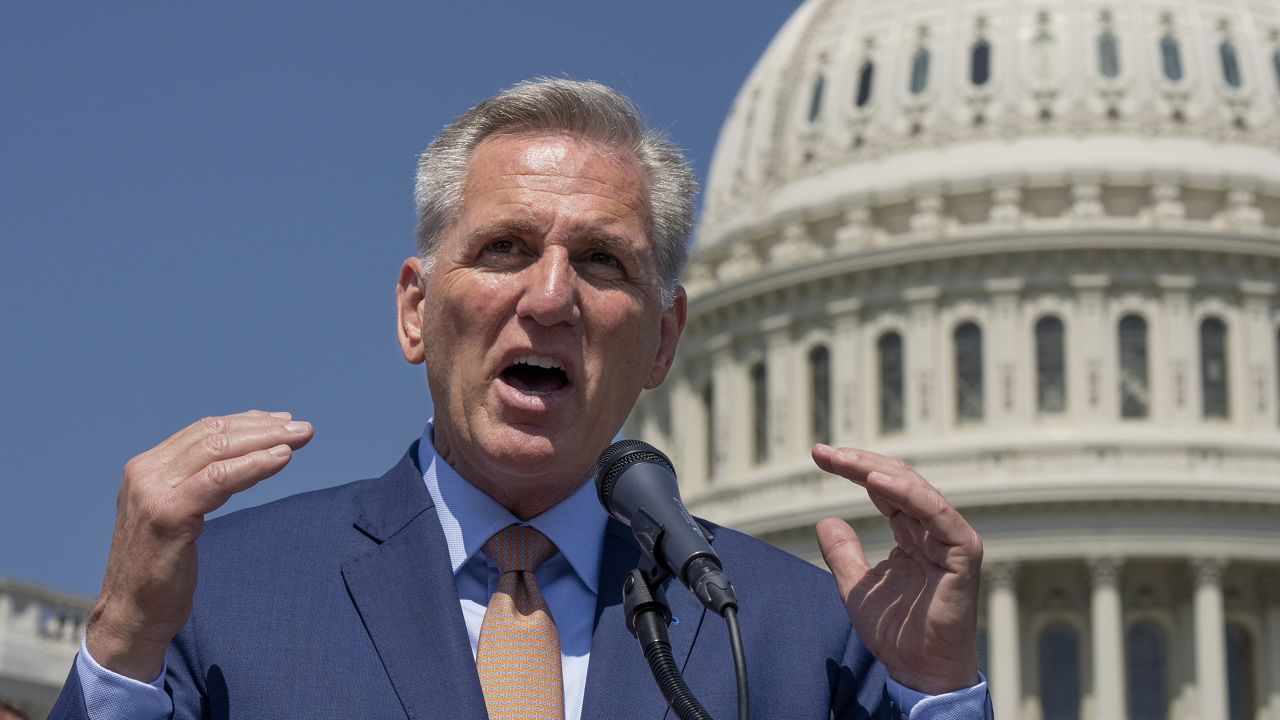Unsatisfied with the spending cuts in the law President Joe Biden signed to avoid a first-ever default, Republicans on the rightmost reaches of the House and Senate continued to pummel Speaker Kevin McCarthy, R-Calif., for cutting a deal that ultimately received more support from Democrats than his own party.
“The bill fails to accomplish literally any of the major objectives that they claim that it accomplishes,” Sen. Mike Lee of Utah said on Fox News’ “Sunday Morning Futures.” “Shalanda Young, the [Office of Management and Budget] director in the Biden administration, said ‘we're gonna win with the fine print.’ She played Republicans here and they're still claiming victory.”
“This is not a victory. This is capitulation,” Lee added.
Earlier on the same Fox News program, McCarthy defended the deal, framing it as the largest spending cut in American history.
“More than $2.1 trillion is going to be cut over the next 10 years. And think about where we’ve come from. The President said he would never negotiate with us,” McCarthy said. “We actually more than you thought in the process that we could get to this point. So it’s not perfect, but it is a beginning of turning the ship. Now we’ve got to do the rest of the job.”
But Republicans to McCarthy’s right, like Lee, wanted more cuts to key Biden initiatives and a gutting of the executive branch’s authority to implement regulations.
Democrats swallowed spending cuts and policies like work requirements for some government aid recipients in exchange for avoiding a default on the country’s debt, which economists and policymakers believed would have been catastrophic for the global economy. The deal suspended the limit on how much debt the United States can take on until Jan. 1, 2025, after the 2024 election.
Presidential hopefuls vying for the Republican 2024 nomination were critics of the deal as well, with Florida Gov. Ron DeSantis calling it “totally inadequate” earlier this week and former Vice President Mike Pence — who is set to declare his candidacy this week — describing it as “Washington smoke and mirror games.” South Carolina Sen. Tim Scott voted against the measure on Thursday and publicly criticized the deal.
And the current frontrunner, former President Donald Trump, said he would have preferred if Republicans let the country default on its debt to extract more concessions from Biden, who Trump argued would get blamed for the economic consequences.
“We’ll get it fixed and will get it fixed properly in two years,” he told an Iowa radio talk show host on Wednesday.
In the House, 165 Democrats voted for the deal, compared to 149 Republicans. In the Senate, the contrast was even more stark, with 44 Democrats, 17 Republicans and two independents voting in favor.
McCarthy’s reliance on Democratic votes “shows weakness,” Rep. Ken Buck, R-Colo., a member of the far-right House Freedom Caucus, said on CNN’s “State of the Union” on Sunday, adding the speaker “has credibility issues.”
“That’s the sort of weakness that Republicans are looking at and trying to make a determination whether he will be fit to serve,” Buck said, though he stopped short of committing to a vote to remove McCarthy from the speakership. He had floated the idea on a call with the House Freedom Caucus earlier this week.
One of the House Republican members tasked with negotiating the deal, Rep. Garret Graves of Louisiana said on CBS News’ “Face the Nation” that Buck’s view was “not a mainstream position.”
“Speaker McCarthy’s position is absolutely safe,” Graves said.
As part of the new House rules passed earlier this year by the Republican majority, any single member can initiate a vote to remove the speaker, but would require a majority of the 435-person chamber.
On Saturday, former Trump adviser Steve Bannon, a powerful voice on the American far-right, said on his streaming show that “McCarthy’s got to go. There’s just no doubt.”
“That team of Graves, McHenry, and McCarthy, they can’t negotiate. They negotiated a surrender,” Bannon said. “You can’t do that. You got to fight. You can’t negotiate a surrender.”



